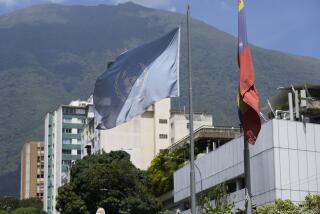Moscow Hit for Ending Chechnya Rights Monitoring
- Share via
MOSCOW — International human rights groups Wednesday criticized Russia’s decision not to allow the Organization for Security and Cooperation in Europe to continue its work in Chechnya, after talks in Vienna this week failed to produce a deal on the issue.
Russian Foreign Minister Igor S. Ivanov defended Moscow’s stance, arguing that the failure to renew the OSCE mandate in the separatist republic did not mean Russia was unwilling to cooperate with the European organization. But he insisted that the OSCE should stick to a purely humanitarian role and stay away from monitoring human rights.
New York-based Human Rights Watch criticized Russia’s decision, describing it as an attempt to shut out international scrutiny of human rights in strife-torn Chechnya.
The OSCE’s mandate in the republic expired at midnight Tuesday, and the group ceased operations there Wednesday.
The organization has been working for a peaceful settlement in Chechnya and monitoring rights abuses there. Both roles offend Moscow, which resents external criticism of its bloody military campaign to subdue separatist rebels in the republic.
The Kremlin has always had a prickly relationship with the OSCE because of the organization’s criticism of Russian actions in Chechnya.
The OSCE helped engineer peace talks between the rebels and Moscow in the 1994-96 Chechen war, leading to a peace deal and Russia’s withdrawal. The OSCE, which also facilitates international aid, left Chechnya in 1999 after a wave of kidnappings and crime by Chechen warlords. When it returned in 2001, Russian officials warned the group to keep out of politics.
Since Russian President Vladimir V. Putin backed the U.S.-declared war on terrorism, Washington’s pressure on Moscow over Russia’s actions in Chechnya -- where some separatists have been linked to militant groups such as Al Qaeda -- has been relatively muted.
The OSCE, the Russian human rights group Memorial and Human Rights Watch have continued to raise concerns over Moscow’s actions in Chechnya -- in particular, the intense Russian pressure on Chechen refugees in Ingushetia, a Russian republic neighboring Chechnya, to go home even though mine explosions, shootings, skirmishes and bomb blasts are a regular part of life there.
Another key concern is Russia’s “mopping-up operations,” in which villages are blockaded and searched and men are arrested, some reportedly never to be seen again.
“Closing down the OSCE mission is part of Russia’s strategy to cut off scrutiny of human rights conditions in Chechnya and portray the situation as normalizing,” Elizabeth Andersen, executive director of Human Rights Watch’s Europe and Central Asia division, said in a statement issued in New York on Wednesday. “First they announced closure of the camps for people displaced by the conflict, and now they are shutting out the OSCE. Unfortunately, the situation remains far from normal.”
Ivanov said Russia was willing to discuss new forms of cooperation with the OSCE, a signal that Moscow is firm in its decision to exclude the OSCE’s political and human rights activities in Chechnya.
He spoke of a “new reality” in Chechnya, arguing that recent actions by the rebels call for a revision of the role of international agencies there. Ivanov cited an October attack on a Moscow theater and last week’s suicide blast in Grozny, the Chechen capital, which Russian officials say killed about 80 people.
Oleg Orlov, head of Memorial, said the Russian authorities were unhappy about the OSCE’s human rights criticism.
“While this group was working in Chechnya, it faced permanent confrontation from the Russian authorities,” Orlov said.
But he said Moscow’s tough stance on the OSCE was possible only because U.S. and European leaders had softened their criticism of Russia’s approach in the southern republic.
“While the OSCE mandate was still valid, those leaders displayed endless compliance to the Russian side,” he said.
Andersen of Human Rights Watch called on member governments to pressure Russia to let the OSCE continue in Chechnya as a human rights and political observer.
“It is very important that the U.S. and other OSCE member states continue to impress upon Russia the importance they place on this mission,” she said.
More to Read
Sign up for Essential California
The most important California stories and recommendations in your inbox every morning.
You may occasionally receive promotional content from the Los Angeles Times.










